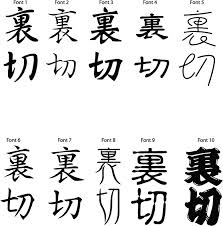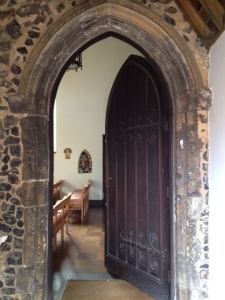Recently I had a conversation about a lot of things that have happened in my life. The where, when, why and with whom don’t matter, the things we talked about aren’t what really matter. But one of the thoughts that remained with me was a word I heard for the first time that evening. Or probably I should say, the not knowing a word I heard for the first time that evening has remained with me.
The word is uragiri, 裏切り (うらぎり) and means betrayal. You can see a kind of primer of different calligraphic styles at the top of this post. It’s a compound of 裏 (うら, meaning ‘back’ or ‘behind’ ) and 切る (きる, meaning ‘cut’).
I told someone about a relationship I had had a long time ago, a relationship that had been very important in my life, a person whom I had loved very much. It was a long, convoluted story, it was messy and probably not such an unusual situation. I was explaining my part in it, what remained for me, and their reaction was this word, in Japanese. That it had been a betrayal of me, of my trust and my feelings, and I suppose it was, but I had not framed it as that. I suppose by the end of it all I knew what I was dealing with and it was more a matter of scale than the naming of the treachery itself.
My reaction to their reaction was two things:
I thought, hmmm, I have never wanted to roll over and be the victim here, the person who was betrayed, because I knew I had known I was being lied to and I had continued. The scale of it was unknown to me, but the basic dynamic was not. I chose to trust, even when, with hindsight, I can see that it was not the smartest thing to do. I knew better for a long time, I have to admit that. I learned a lot about myself, about other people, and at the time I did not want to, and now I do not want to give another person an acknowledgement of such power in my life. No. I was complicit in this, and I choose to frame it as such.
But at the same time I thought, gosh, I have lived in Japan for over twenty years. I started learning Chinese and Japanese over half (ahem, almost two thirds) of my life ago, and I have never heard this word before. I love learning new words. I find the etymology of words fascinating. Whether it’s the Latin root of an English word or the meaning of the kanji in a Chinese or Japanese compound, I like to know. I like to break it down, look at it from different angles, see how it’s used.
In this instance, though, I didn’t know the word, I had never heard it before, and the not knowing for so long made me happy, grateful. I don’t think it’s a word I use in English, and I didn’t think I could tell you the word in French, Spanish, Latin, Chinese . . . I checked and all the words were new to me, though I think if I had seen the European ones in context I would have been able to take a guess.
What a gift, to not know a word like that, and what a gift, also, to have a conversation which showed me that. And now that I know it?
I won’t be using it any time soon.



